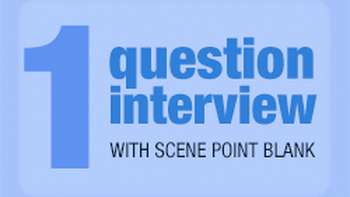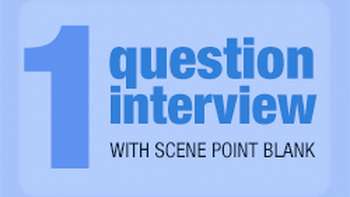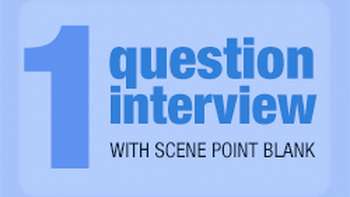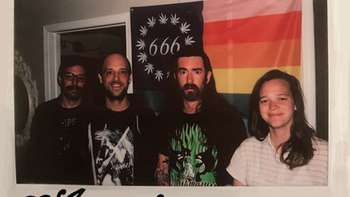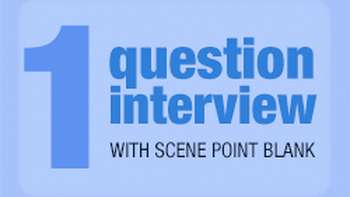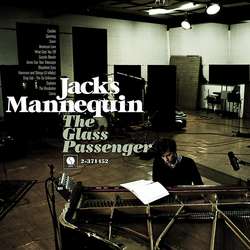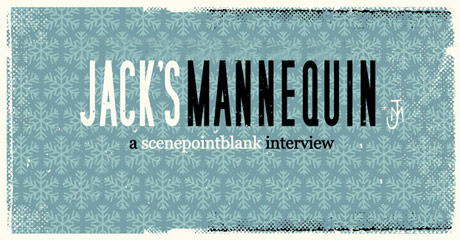
Jack's Mannequin, Andrew McMahon's side project from the widely successful Something Corporate, features a personal edge that McMahon's previous work seemed unable to replicate. Emotional, therapeutic and cathartic, Jack's Mannequin is the sound, as McMahon himself puts it, of a healing process. Scene Point Blank's Graham sat down with Andrew to talk about the band.
Scene Point Blank: After the release of your last album, Jack's Mannequin went out on a very well received headlining tour. The dates you're doing now, with Panic! at the Disco, see you having to cater to an audience who aren't necessarily there to see you. I was wondering what the crowd reaction has been like, and is there any expectations you have about people are seeing you for the first time?
Andrew McMahon: The crowd on this tour has really been incredible. For us, being able to play for ten thousand people a night is pretty awesome. The only others times I've gone into arenas, aside from one off shows that I've done with Something Corporate, was with Good Charlotte. Not to slag those guys, but it was a much different audience then what we were really going for at the time. The label told us we needed to go out on the road, and it was what it was.
This crowd, though it's still kind of a pop crowd, is made up of mainly young females, you know: sixteen/seventeen year olds. It's a good demographic for us to be playing to and they seem to be really getting it. We have a lot of kids who know the words to the songs, and a lot of kids who know "Dark Blue" and "The Mixed Tape" cause they've been on the video channels that Panic! at the Disco's been on. That's been awesome, and I couldn't ask for anything more.
Scene Point Blank: For the kids who are hearing you for the first time, is there ever a notion of needing to impress anyone?
Andrew McMahon: Well, yeah, kind of. It's our job to put on a show that makes people want to see us again. I mean, it's a lot easier to play to people who know your band, and know your songs, and will be into it in some way no matter what happens. The real challenge is trying to get someone who doesn't know you at all, and doesn't have any kind of expectation going into it, to go from not knowing you period to being a fan when they leave.
For me especially, this tour worked out really well in the field of my recovery, cause I finally feel like my head is finally catching up to my body. After being sick, to be on these big stages has really been convenient. I won't lie, in the summer and the subsequent headlining tour that we did, I was definitely getting better but I had some nights where I just wasn't feeling so good. You know what I mean? It was a little bit of a toss up how the show would go, and how my body would react to the show itself. On this tour, the past seven shows, I feel like I'm at a level which is very similar to what I was doing before I got sick. I don't go out and poll the audience at the end of the night, but seemingly from the crowd reactions, and the people that we've had in the audience because we always send our friends out to go see what the vibe is, it's been pretty good.
Scene Point Blank: Mentioning your sickness; I don't want to dwell too much on it, but in your lyrics, and website, deal with some issues which are very personal to you. Other artists in similar situations tend to be rather secretive about these types of things, while you've been quite forward during the whole process. Does there ever come a point where it feels like too much exposure? Why do you feel the need to be so open with what's going on?
Andrew McMahon: I think at some points, more so recently than ever. Strangely enough, I probably gave more away when I was sick, and recovering, and in the middle of the whole thing. For whatever reason that felt like a really natural part of my whole healing process, or whatever, and I felt really comfortable with the whole thing. Now that the whole thing is kind of behind me, it gets kind of redundant at some points. I'll be doing a radio interview for instance and, well, in my opinion, who listening to the radio wants to listen to somebody talk about having cancer. I mean it's your rock station, and you've got some local rock DJ trying to Barbra Walters you into saying some heavy shit on the radio. I don't see that as an appropriate medium for those types of discussions.
I've had a couple of situations where it's been a little invasive and a little prying, but it was sort of my fault for putting so much out there to begin with. I think people think I'm pretty comfortable with the whole thing, but I also put that stuff out there when it was on my own terms. I was in a space where I was comfortable, and sometimes when people hit you over the head with it or won't let it go, it gets frustrating. When they want an interview only talking about my sickness, I'm thinking "Well I'm fifteen months in remission" and granted a large part of that remission was a recovery process but still this happened to me over a year and a half ago and I'm trying to move past it. It's still a pretty relevant part of who I am and most people are pretty good about it but some times it gets to be a bit much.
Scene Point Blank: Along those lines, the personal content of your lyrics in Jack's Mannequin has varied quite a bit from the Something Corporate days. What made Everything in Transit come out like it did?
Andrew McMahon: I definitely tried to be a lot more pointed with this. I did my best to be as direct with this album as possible. A lot of that had to do with when I was writing this, I was writing it as a love letter to someone I wasn't really speaking with at that point, and frankly, I wasn't sure if I was ever going to again. With a lot of Something Corporate records I think it was very easy for me to dodge certain things and hide behind the way I would articulate certain lyrics. With this record I was like: fuck it, I'm putting it all out on the table and I don't want there to be even a question, at least when it came to who I was writing for, that this is who I'm writing for and this is what I'm trying to say.
I learned a lot. For me, as a writer, that's a much more challenging thing to do. To write good lyrics that are meaningful and sound nice, in terms of the syntax and in terms of how they actually play out, but also really say what you're trying to say and not hide behind anything. That's a tough thing to do, as a writer and as a person, but I feel that I'm better when I do that. I hope that I can continue to take that approach but when it comes to music I've always created for me first and everyone else second. In turn, a lot of times I end up saying things that people may be shocked I would talk about in a public scenario. I think that's what makes artist's good; that in some sense they can wear their heart on their sleeves but in other sense maintain their silence and leave it in the art. I'm sure there will be a lot of things that I try to put to rest on my next record, and that'll open up a whole new wave of questions which will have me responding " Oh, just listen to the record please!" (laughs) It is what it is. It's a part of what I do, and I would hate to not be as telling as to keep someone from knowing exactly what's on my mind.
